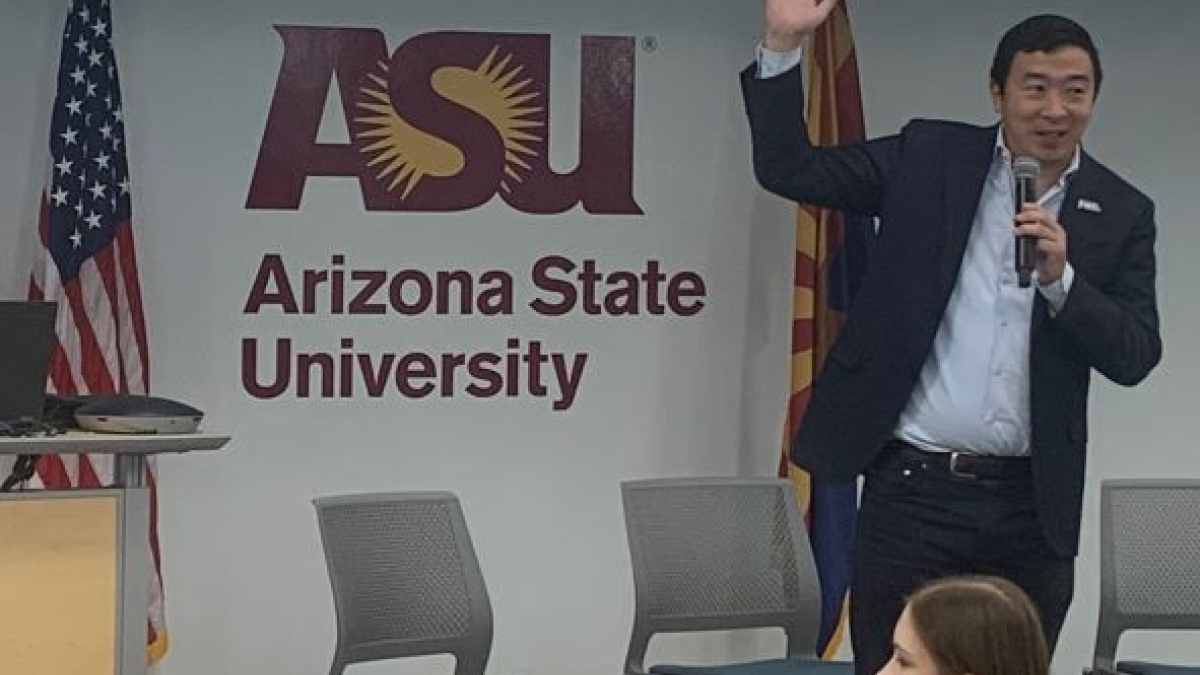’20 presidential candidate Andrew Yang talks third parties, ranked-choice voting during ASU appearance

Andrew Yang, a 2020 Democratic presidential candidate who today co-chairs the national Forward Party, spoke to students on Nov. 17 at the Westward Ho hotel in downtown Phoenix. Photo by Mark J. Scarp/ASU
The two-party system is in serious need of overhaul if the United States has any chance of solving issues important to new generations of voters, most of whom are not party members, former presidential candidate Andrew Yang told Arizona State University students Nov. 17.
Yang, 47, is a business executive who joined — and departed early from — the crowded 2020 field of Democratic presidential candidates.
Today, he and former New Jersey Gov. Christine Todd Whitman co-chair the new Forward Party. In his appearance on the Downtown Phoenix campus, Yang advocated for active third parties — he said there should be “five, six or seven” of them — and for ranked-choice voting as two important fixes to the American political system.
Yang’s appearance was sponsored by ASU’s Center for an Independent and Sustainable Democracy.
Yang spoke for several minutes before being interviewed on stage at the former Westward Ho hotel by two seniors in the School of Public Affairs: Jordyn Walhof, pursuing three bachelor’s degrees in public service and public policy (law and policy), political science and anthropology; and Katie Fite, pursuing a bachelor’s degree in public service and public policy (emergency management).
Yang said that during the years before his presidential run, he observed automation and artificial intelligence eliminating many of the jobs in five areas held by about half of working Americans today. Jobs in clerical or administration, food preparation, retail, transportation and manufacturing are overwhelmingly filled by people without college degrees, he said.
In 2016, Republican Donald Trump won the White House with victories in industrial Midwestern states that had often been in the Democratic column, Yang said. Major cities in those states lost population as they hemorrhaged manufacturing jobs.
“There is a direct correlation from loss of manufacturing jobs to support for Trump for formerly blue areas,” he said.
Yang said that since his presidential campaign, he remains concerned about the future of American politics. He said young people care about such issues as climate change, public indebtedness and the general effectiveness of our political system.
“We left you with a colossal bill of goods,” he said. “The political system is set up not to work. And it’s getting worse.”
The center’s co-director and School of Public Affairs Professor Thom Reilly said after the event that younger Arizona voters are not being drawn to the two major parties. Today, 52% of both millennials and Generation Z members in Arizona are not affiliated with a party, he said.
“That’s astoundingly large, particularly when you think of where these young people get their information,” Reilly said, referring to social media and other nontraditional sources.
K–12 schools need to spend more time on civic education, Reilly said, because many young people become adults without knowing how to register and vote, and how to evaluate the candidates and questions on ballots.
“At least in Arizona we have (the Citizens) Clean Elections (Commission), a nonpartisan organization not present in other states,” Reilly said.
Arizona is ‘ground zero’ for potential change
Yang said Arizona, as a purple state with relatively even numbers of voters choosing Republicans and Democrats, is “ground zero” for potential change.
“You are going to be a hotbed of an effort to modernize and safeguard American democracy,” he said.
Ranked-choice voting opens primaries to all voters regardless of party membership or none at all. Voters may make multiple choices of candidates for an office ranked in order of preference. This will help eliminate the polarized kind of campaigning and candidates emerging from today’s primary system, Yang said.
Primaries attract small numbers of voters, typically around 15% or 16%, meaning candidates are beholden to the wishes of a small minority of their constituencies, Yang said. Social media also can fan the flames of opinion, which frequently leads to more extremist candidates, he said.
Yang said a handful of states, such as Arizona, Georgia, Nevada and Pennsylvania, are just purple enough for third parties to form there and grow.
“Arizona is fortunate to be purple,” he said. “When change occurs, you’ll see leaders come out of the woodwork that you don’t see now.”
More Law, journalism and politics

Native Vote works to ensure the right to vote for Arizona's Native Americans
The Navajo Nation is in a remote area of northeastern Arizona, far away from the hustle of urban life. The 27,400-acre…

New report documents Latinos’ critical roles in AI
According to a new report that traces the important role Latinos are playing in the growth of artificial intelligence technology…

ASU's Carnegie-Knight News21 project examines the state of American democracy
In the latest project of Carnegie-Knight News21, a national reporting initiative and fellowship headquartered at Arizona State…